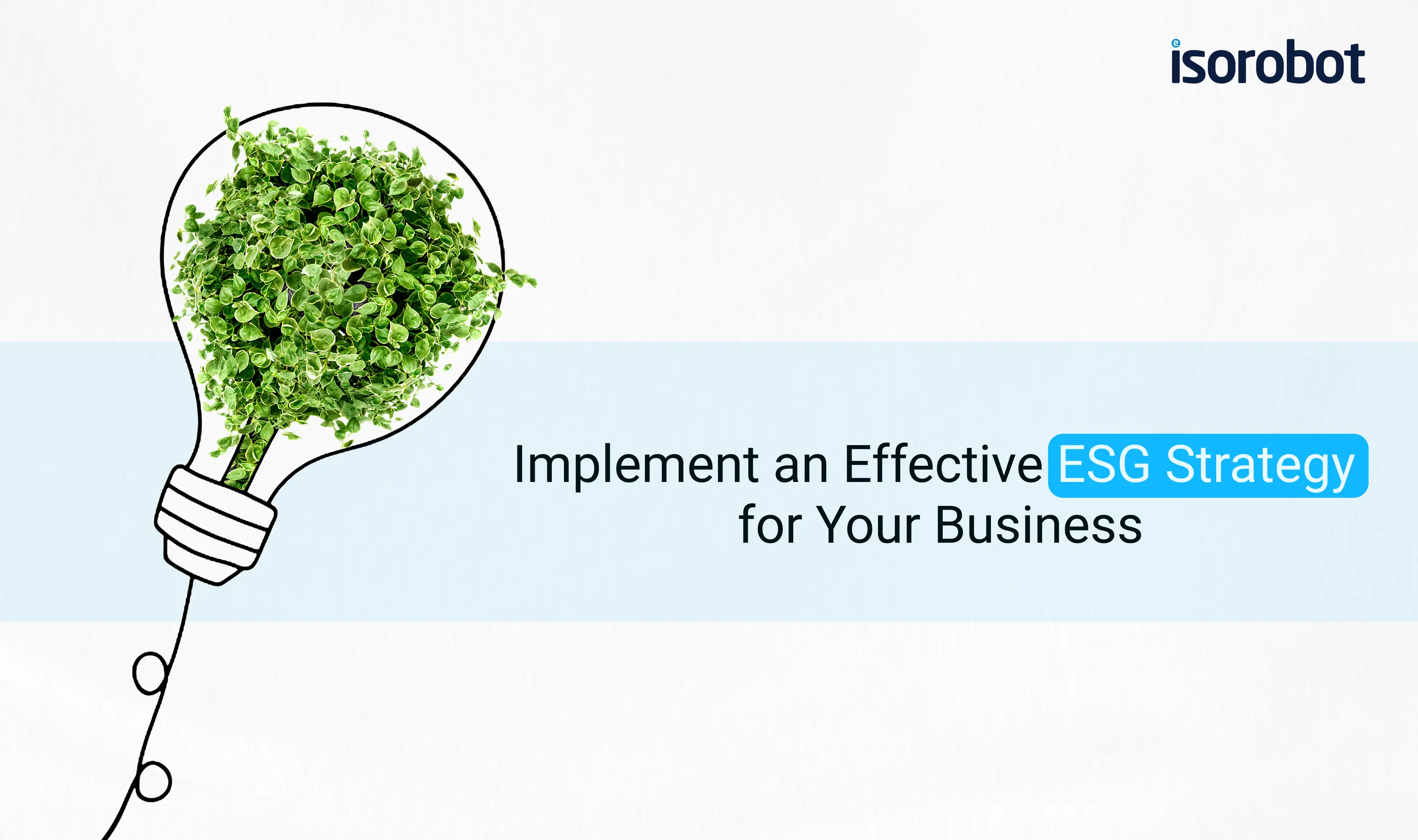How to Implement an Effective ESG Strategy for Your Business.

Integrating software solutions enables you to remain compliant with regulations, manage financial and operational risks, and promote transparency. Software solutions can help automate the process of data collection, analysis, and reporting. This saves time and resources, and also provides accurate and timely data for decision-making.
Benefits of a well-implemented ESG strategy
1. Better risk management and mitigation
By considering environmental, social, and governance factors, businesses can identify and mitigate potential risks to their operations and reputation. This helps businesses stay ahead of risks and prevent negative impacts on their business.
2. Enhanced brand reputation and customer loyalty
A strong ESG strategy can demonstrate a company's commitment to sustainability and social responsibility, which can build trust and loyalty among customers. By prioritising ESG factors, businesses can differentiate themselves from competitors and position themselves as industry leaders.
3. Access to capital and lower cost of capital
Investors are increasingly prioritising ESG factors when making investment decisions. This means companies with a strong ESG track record may have better access to funding and lower borrowing costs. By prioritising sustainability, businesses can tap into the growing pool of socially responsible investors.
4. Increased employee satisfaction and retention
Employees are increasingly looking for purpose-driven employers who prioritise sustainability and social responsibility, making a strong ESG strategy a key factor in attracting and retaining talent.
Conclusion
Businesses today cannot afford to downplay the significance of responsibility and sustainability. Implementing an ESG strategy can benefit your company in the long run, from attracting investors and customers to enhancing efficiency and risk management, in addition to having a positive impact on the environment and society. You can create an ESG strategy that works for your company and pave the way for a more sustainable and responsible future by following the instructions provided in this guide.
">
Environmental, Social, and Governance, or ESG, is no longer just a trendy term in business. It's a framework that companies can use to gauge and enhance their contribution to responsibility and sustainability. ESG principles can have a long-lasting effect on your company, from bringing in customers and investors who value sustainability to reducing costs and enhancing risk management. However, putting an ESG strategy into practice can be difficult, especially if you're new to it. We'll look at how to implement an efficient ESG strategy for your company in this blog.
- Be clear about your ESG mission and goals.
When it comes to implementing an ESG strategy, the first step is to define your goals and mission. Your ESG goals and mission should be clearly defined, and all your efforts should be aligned in the same direction. Your brand's sustainability goals should also be communicated to all stakeholders. This helps ensure that everyone in your organisation is working towards a common goal.
2. Choose a suitable ESG strategy framework
There are many ESG frameworks available, and it's important to choose one that suits your business needs. The Global Reporting Initiative (GRI) framework is one of the most commonly used ESG frameworks. It provides guidelines for reporting on sustainability issues, including environmental, social, and governance factors.
3. Organise a team of senior executives and external experts on ESG
Having the right team members to drive your ESG goals is important for higher ROI and to build trust among all stakeholders. When organising a team, it's important to consider individuals with experience in ESG strategies, sustainability, and corporate responsibility. Additionally, you can consider working with external ESG experts who can help you complete certifications and achieve greater efficiencies.
4. Promote your ESG performance
Promoting your good ESG performance is vital to reap all the benefits of taking the sustainable path. You can use email and social media campaigns, website promotions, and press releases to spread the word. By highlighting your efforts towards sustainability, you can attract investors and customers who prioritise sustainability.
5. Integrate solutions to streamline ESG operations
Integrating software solutions enables you to remain compliant with regulations, manage financial and operational risks, and promote transparency. Software solutions can help automate the process of data collection, analysis, and reporting. This saves time and resources, and also provides accurate and timely data for decision-making.
Benefits of a well-implemented ESG strategy
1. Better risk management and mitigation
By considering environmental, social, and governance factors, businesses can identify and mitigate potential risks to their operations and reputation. This helps businesses stay ahead of risks and prevent negative impacts on their business.
2. Enhanced brand reputation and customer loyalty
A strong ESG strategy can demonstrate a company's commitment to sustainability and social responsibility, which can build trust and loyalty among customers. By prioritising ESG factors, businesses can differentiate themselves from competitors and position themselves as industry leaders.
3. Access to capital and lower cost of capital
Investors are increasingly prioritising ESG factors when making investment decisions. This means companies with a strong ESG track record may have better access to funding and lower borrowing costs. By prioritising sustainability, businesses can tap into the growing pool of socially responsible investors.
4. Increased employee satisfaction and retention
Employees are increasingly looking for purpose-driven employers who prioritise sustainability and social responsibility, making a strong ESG strategy a key factor in attracting and retaining talent.
Conclusion
Businesses today cannot afford to downplay the significance of responsibility and sustainability. Implementing an ESG strategy can benefit your company in the long run, from attracting investors and customers to enhancing efficiency and risk management, in addition to having a positive impact on the environment and society. You can create an ESG strategy that works for your company and pave the way for a more sustainable and responsible future by following the instructions provided in this guide.